 2 citations,
January 2022 in “Lasers in Medical Science”
2 citations,
January 2022 in “Lasers in Medical Science” Using a carbon dioxide laser and platelet-rich plasma together can effectively restore hair and patients are generally satisfied with the results.
 2 citations,
January 2022 in “Skin appendage disorders”
2 citations,
January 2022 in “Skin appendage disorders” A combination of methotrexate injections and CO2 laser treatment led to complete hair regrowth in two patients with hard-to-treat alopecia.
 1 citations,
January 2024 in “Journal of Cutaneous and Aesthetic Surgery”
1 citations,
January 2024 in “Journal of Cutaneous and Aesthetic Surgery” Fractional CO2 laser with topical triamcinolone is more effective and safer for treating alopecia areata than intralesional triamcinolone.
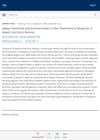 September 2024 in “Journal of the American Academy of Dermatology”
September 2024 in “Journal of the American Academy of Dermatology” Fractional and excimer lasers effectively treat various types of alopecia and promote hair growth.
 July 2024 in “Journal of Cosmetic Dermatology”
July 2024 in “Journal of Cosmetic Dermatology” Fractional laser therapy is a promising, effective, and minimally invasive treatment for hair loss.
 May 2024 in “Journal of the Egyptian Women's Dermatologic Society /Journal of the Egyptian Women's Dermatologic Society”
May 2024 in “Journal of the Egyptian Women's Dermatologic Society /Journal of the Egyptian Women's Dermatologic Society” Combining fractional CO2 laser and PRP is very effective for treating female hair loss.
 February 2024 in “Journal of Cosmetic Dermatology”
February 2024 in “Journal of Cosmetic Dermatology” White hair patch repigmented and hair regrew in a balding patient after treatment with exosomes and laser.
 June 2023 in “Dermatology and Therapy”
June 2023 in “Dermatology and Therapy” Using fractional CO2 laser with halometasone cream works better for chronic hand eczema than just the cream, improving symptoms and quality of life with fewer relapses.
 April 2023 in “Research Square (Research Square)”
April 2023 in “Research Square (Research Square)” Combining stromal vascular fraction (SVF) injections with fractional CO2 laser treatment is more effective for treating burn scars than using the laser alone.
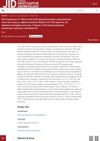 April 2023 in “Journal of Investigative Dermatology”
April 2023 in “Journal of Investigative Dermatology” Both laser treatments improved acne scars similarly, but the Nd:YAG laser was safer and less painful, while the Er:YAG laser left patients slightly more satisfied.
 February 2023 in “Archives of Dermatological Research”
February 2023 in “Archives of Dermatological Research” Laser treatment, especially when combined with other therapies, is effective for hair regrowth in alopecia areata.
 January 2023 in “Journal of cosmetic dermatology”
January 2023 in “Journal of cosmetic dermatology” Fractional lasers effectively treat alopecia areata, especially when combined with minoxidil or cortisol.
 January 2023 in “The Egyptian Journal of Hospital Medicine ”
January 2023 in “The Egyptian Journal of Hospital Medicine ” Fractional CO2 laser treatment could be effective for alopecia areata.
 April 2022 in “Research Square (Research Square)”
April 2022 in “Research Square (Research Square)” The combination of laser and topical steroids is more effective for treating alopecia areata than topical steroids alone.
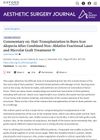 July 2021 in “Aesthetic Surgery Journal”
July 2021 in “Aesthetic Surgery Journal” Using lasers and fat grafting before hair transplant improves hair growth on scarred skin.
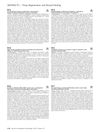 April 2019 in “Journal of Investigative Dermatology”
April 2019 in “Journal of Investigative Dermatology” Fractional photothermolysis helps wounds heal with minimal scarring.
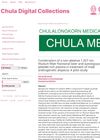 January 2019 in “Chulalongkorn Medical Journal”
January 2019 in “Chulalongkorn Medical Journal” Using a special laser and platelet-rich plasma together is safe and improves hair growth in men with hair loss.
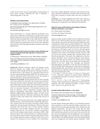
Fractional CO2 laser is more effective and safer than steroid injections for treating alopecia areata.
Fractional laser resurfacing is effective for skin conditions, has lasting results, quick recovery, and is safe but requires careful consideration of risks.
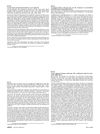 February 2009 in “Journal of The American Academy of Dermatology”
February 2009 in “Journal of The American Academy of Dermatology” Fractional infrared technology is effective and safe for treating cervical laxity.
October 2022 in “Dermatology practical & conceptual” Both treatments help hair regrowth, with PRP being slightly better.
October 2022 in “Dermatologic Therapy” Both treatments for resistant alopecia areata were equally effective.
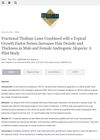 March 2022 in “Hair transplant forum international”
March 2022 in “Hair transplant forum international” Using a special laser and growth serum can safely increase hair thickness and density in people with hair loss.
January 2022 in “The Egyptian Journal of Hospital Medicine” Combining fractional laser with minoxidil 5% is more effective for treating male hair loss than using minoxidil 5% alone.
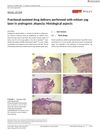 January 2021 in “Dermatologic Therapy”
January 2021 in “Dermatologic Therapy” Channels stay open for 24 hours, making laser treatment potentially effective for hair loss.
 55 citations,
June 2013 in “Dermatologic Surgery”
55 citations,
June 2013 in “Dermatologic Surgery” Ablative fractional resurfacing could improve how well topical drugs penetrate the skin, but more research is needed to fine-tune the method.
 46 citations,
March 2013 in “Journal of Cosmetic and Laser Therapy”
46 citations,
March 2013 in “Journal of Cosmetic and Laser Therapy” Non-ablative and ablative fractional lasers helped hair growth in some cases without major side effects, but didn't work for all hair disorders.
 16 citations,
April 2015 in “Lasers in Surgery and Medicine”
16 citations,
April 2015 in “Lasers in Surgery and Medicine” Using a fractional laser can stimulate hair growth, but the intensity and duration of inflammation are crucial. Too much can cause ulcers and scarring. Lower beam energy and fewer treatments are recommended to avoid damage.
10 citations,
August 2020 in “Dermatologic Surgery” Conditioned media from stem cells improves hair growth after laser treatment for hair loss.
 8 citations,
June 2019 in “Journal of Cosmetic Dermatology”
8 citations,
June 2019 in “Journal of Cosmetic Dermatology” Using a nonablative fractional laser with topical minoxidil can effectively and safely promote hair regrowth in alopecia areata patients.
























